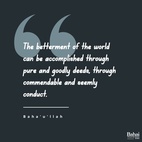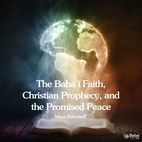The views expressed in our content reflect individual perspectives and do not represent the official views of the Baha'i Faith.
The most popular medium of musical expression for quite a long period of time, in recent years is the arena of rock & roll, though we have kind of dropped the “roll” part of that label many years ago.
I’m a jazz musician, but I love almost every form of music, with few exceptions. When I listen to rock & roll, I try to offer the same respect and open mindedness that you would if you were attempting to gain some understanding of Gagaku—the classical court orchestra music of Japan—for me, the most difficult expression of music that I have ever encountered. It took me months before I could hear and begin to comprehend Gagaku’s structure, complexity, and hidden beauty, before I could begin to appreciate it.
See an example of Japanese Gagaku music below:
Also, I know what it’s like to be a part of a medium of music castigated by the, old established musicians as being unmusical. During my jazz career, I heard many unpleasant descriptions of how they viewed our way of expressing music, so I’ve seriously looked for a way to understand the essence of rock & roll.
At the time, I taught music in a high school in Stratford, Connecticut and I respected each of my students for their commitment to the classical and contemporary music that I introduced them to as a part of the Wind Ensemble. In fact, the young men in that ensemble—who also had a rock band—were some of the very best musicians that I worked with in that program.
They all took great pride in their participation in the music that I brought to them, as it did challenge their growing musicianship in that idiom of music. So I knew that they weren’t just playing rock & roll to endear themselves to their classmates.
When they asked me to come to one of their performances of their rock group, they said they really wanted me to hear what they were doing, and to critique their performance to help them get better. I was not going to ignore that request, as I wanted a better understanding of what they were doing, too.
I arrived at the place where they played and went in. I was committed to fulfill their desire for me to evaluate their work. The first thing that struck me was the volume, as it was so loud that I couldn’t hear anything definable. As my old ears became adjusted to the intensity of the sound, I began to hear what they were playing: essentially, a simple Blues format with a lot of distortion purposely incorporated in that sound. I listened for the whole set they played, listening for and expecting to hear some variants on the Blues, but I really could not identify any other musical format in their songs.
Remember—rock & roll is not an unfamiliar format for me to hear or even to appreciate—I came up playing R&B as the foundation of my own music.
When the group finished that set and took a break, we all went outside to get some fresh air and talk with each other. I have to admit it took me a while to actually hear clearly, as my ears were still kind of protecting themselves from what they had gone through. But finally they did clear, and the group asked if I could give them my impression of what I’d heard. I tried to be as detached as I could, and even to be a constructive critic of what I heard. I wanted to be as responsible to them as they were to me, so I said: “Fundamentally, just about everything that I could hear was, basically, Blues.”
“Yes, that is pretty much what we play, though we do extend things, every now and then, to allow one of us to take off and solo.” I had a few more comments about things I heard, and then I asked about the one feature I could truly not understand the purpose of: “Why the volume and all the distortion?”
“Mr. Holladay,” the band members told me, “we’re trying to follow the recommendations and information that we’ve received from some of the professional rock & roll bands we know. They told us that what they were doing was trying to create the feeling within their audience of a greater elevation of excitement. We found that increasing their level of adrenaline, without their knowing it, would accomplish that goal. Though they warned us that you have to be careful to keep control of that adrenaline rush so that you don’t push them too far so that the rush of adrenaline can be kept just shy of going past the point to where it becomes violence. Up to that point, the rush feels like an exaggerated sense of excitement and elevated joy, which makes what we are doing more desirable for the people who hire us. That is why we use the volume and the distortion—it helps achieve that result.”
Note the need, particularly, in the early days of rock concerts when the entrepreneurs hired guards to keep people from attacking the stage in their overzealous reactions resulting from that extreme adrenaline rush! My question was answered and, for the first time, I began to understand what was going on. Prior to that honest encounter, I kept trying to figure out what it was, musically, that they were doing that brought them, and those like them, so much success.
You might expand on that premise by evaluating why the addition of all the theatrical elements that have been added to all popular concerts and videos to mask what is really being done to the audiences. I have asked people what it was about such and such a concert that was so satisfying, and I have yet to hear anybody identify anything other than, “Man, it was great—really exciting!” Never about the internal elevation of the heart and soul from the beauty and expressiveness of the musical performance.
It also explained, to me, why excellent jazz musicians I knew were trying so hard to find a way to make their music as marketable as the rock bands. Consequently, from what was a very expressive way of offering a musical experience we began to get, instead, what has been identified as Jazz Fusion—an attempt to blend the two very different mediums to make them commercially acceptable and salable. Unfortunately, that took away the embrace of the feeling that had been such a part of the jazz expression, and focused the music on faster and faster tempos to reach that rock & roll adrenaline rush.
Rap, hip-hop, rock & roll and even some country music all seem to have similar aims in today’s over-commercialized and over-hyped musical market—to generate excitement and adrenaline. Each of those forms have excellent practitioners and mediocre ones. Here’s my recommendation: play and listen to the best in each genre, but be careful about their effects on your spirit:
Music is one of the important arts. It has great effect upon human spirit. Musical melodies are a certain something which prove to be accidental upon etheric vibrations, for voice is nothing but the expression of vibrations, which reaching the tympanum, effect the nerves of hearing. Musical melodies are, therefore, those peculiar effects produced by, or from, vibration. However, they have the keenest effect upon the spirit. In sooth, although music is a material affair, yet its tremendous effect is spiritual, and its greatest attachment is to the realm of the spirit. – Abdu’l- Baha, from a talk he gave in Haifa, Palestine.

















Comments
Sign in or create an account
Continue with Facebookor